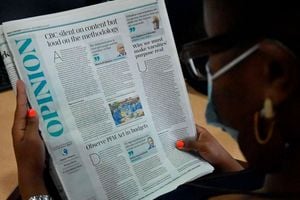
Ian Njoroge at the Milimani Law Courts in Nairobi where he was charged with assaulting and robbing a police officer.
Assaulting a police officer who is performing their official duties is a very serious crime.
Many countries have harsh penalties for that. The public also takes a lot of interest in such cases.
The media, therefore, is expected to report such stories in a fair and balanced manner.
Ian Njoroge is such a case. He is the 19-year-old university student who was captured in a video beating up a policeman, Jacob Ogendo. The video is still doing the rounds.
The teenager, who sported a red ‘Lakers 23’ basketball jersey, was arrested on Sunday and taken to court on Monday to face charges of assault, robbery with violence and resisting arrest.
The media televised the proceedings of Mr Njoroge’s Day One appearance in court. NTV Tonight reported the proceedings with plenty of on-screen graphics that summarised the charges.
However, the graphic "POLICE BATTER CHARGED”, left many viewers perplexed. If the headline is not a typo and is grammatically correct, it can have multiple meanings.
But what was more notable is the NTV storyline. It correctly portrayed the prosecution charges but it was oblivious to the dramatic counter-accusations made by the team of the defence lawyers.
The lawyers claimed that police tortured Mr Njoroge when they arrested him at home, where he fainted twice.
He was again beaten and injured when he was taken into police custody. The lawyers also played a short video showing Corporal Ogendo mishandling Mr Njoroge in his car, injuring him and calling him names.
On Wednesday, the Daily Nation and Taifa Leo published similar stories — minus the dramatic claims by the defence lawyers.
The Nation story, “Student accused of beating up policeman charged with violent robbery”, included only one sentence at the tail end that mentioned torture.
It’s significant that the court ordered the police to take Mr Njoroge to hospital for treatment, accompanied by his parent.
Earlier, on Tuesday, both NMG newspapers had published enterprise stories on the Njoroge saga, headlined (in the Nation) “Inside police operation to seize motorist who assaulted officer". It’s a police-sourced story.
No mention of Mr Njoroge being tortured, but an exciting manhunt.
On Tuesday, The Standard did its own enterprise stories with the headlines “Assault on a policeman sparks debate on conduct, safety”, “Police to blame for the beating meted out to them, says lawyer” and “Police and road users: Is there bad blood between the two?”
The stories, spread over two pages, are interesting reading.
The NTV, Nation and Taifa stories were in great contrast to the Citizen Digital, The Standard and The Star stories, which prioritised the torture claims by the defence lawyers.
“Ian Njoroge was molested, mistreated by police during arrest”, reads the Citizen Digital headline.
“Ian Njoroge, teenager who attacked police officer, claims he was tortured”, reads The Standard headline.
“Ian Njoroge was manhandled and fainted twice during arrest, court told”, reads The Star (digital) headline.
The court appearance was just to hear the charges and enter a plea. Therefore, the claims of torture didn’t require to be proved.
In any case, things said in an open court are absolutely privileged. The media can report them without fear of being accused of defaming or casting aspersions on anyone.
So why did NTV and Nation exclude the accusations of torture in their stories? The answer may lie in gatekeeping — the process of selecting, filtering and presenting news and information to the public.
In the process, journalists consider what is relevant, interesting and important to their audiences.
However, it's worth noting that other factors — such as accuracy, balance and objectivity — also play a significant role in gatekeeping.
While everything said in an open court can be reported, not everything is reported. Because it may not be relevant, significant or of interest to readers, viewers and listeners, in the opinion of the reporters and editors.
In addition, some information may also not be reported due to space or time constraints. What’s more, some information may be omitted for ethical reasons — for example, if they are obscene or vulgar.
Even so, readers expect the media to publish accurate, objective, fair and balanced reports, especially in controversial cases such as the Njoroge saga.
The Public Editor is an independent news ombudsman who handles readers’ complaints on editorial matters including accuracy and journalistic standards. Email: [email protected]. Call or text 0721989264







